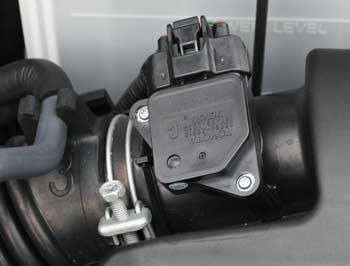The mass airflow sensor plays a crucial role in a vehicle’s engine management system by measuring the amount of air entering the engine. This information is then used to determine the correct fuel injection needed for optimal performance and fuel efficiency.
By accurately monitoring the air intake, the mass airflow sensor ensures the engine receives the appropriate amount of fuel, resulting in smoother operation and better overall efficiency. Without a properly functioning mass airflow sensor, the engine may experience issues such as poor acceleration, decreased fuel economy, and increased emissions.
Therefore, maintaining and replacing a faulty mass airflow sensor is vital for vehicle performance and fuel economy optimization.
The Basics Of Mass Airflow Sensors
Mass airflow sensors are essential components in the functioning of modern vehicles. These sensors measure the amount of air entering the engine, allowing the engine control unit to adjust the fuel injection accordingly. Mass airflow sensors consist of a sensor element, often a hot wire or heated film, and a housing that directs the airflow.
When air passes over the sensor element, it cools down, enabling the measurement of the airflow. This data is then sent to the engine control unit, which calculates the appropriate fuel injection based on the air volume. By accurately monitoring the airflow, mass airflow sensors ensure optimal fuel-to-air ratio, promoting efficient combustion and reducing emissions.
Understanding the purpose and operation of mass airflow sensors is crucial for maintaining a well-functioning vehicle and optimizing performance.
Understanding The Role Of Mass Airflow Sensors
Mass airflow sensors play a crucial role in the overall performance of an engine. These sensors monitor the amount of air entering the engine, allowing the vehicle’s computer to adjust the fuel mixture accordingly. By accurately measuring the airflow, mass airflow sensors ensure optimal combustion and fuel efficiency.
However, when these sensors become faulty, it can greatly affect the vehicle’s performance. Common signs of a bad mass airflow sensor include poor acceleration, stalling, rough idling, and increased fuel consumption. These issues not only compromise the engine’s efficiency but also lead to a decline in overall vehicle performance.
Therefore, understanding the importance of mass airflow sensors and recognizing the symptoms of a malfunctioning sensor is essential in maintaining a properly functioning engine.
Maintaining And Troubleshooting Mass Airflow Sensors
The mass airflow sensor is responsible for measuring the amount of air entering the engine. It plays a crucial role in ensuring proper fuel delivery and efficient engine performance. To maintain the sensor’s optimal functionality, regular maintenance is essential. Cleaning and inspecting the sensor periodically can help remove dirt and debris that may affect its accuracy.
When cleaning, ensure to use a gentle approach and avoid using harsh chemicals that can damage the sensor. Additionally, it is crucial to follow diagnostic procedures when troubleshooting a faulty mass airflow sensor. These procedures can help identify any issues and determine whether the sensor needs to be replaced.
By following these tips, you can ensure the proper maintenance and troubleshooting of mass airflow sensors, leading to improved engine performance and fuel efficiency.

Credit: www.samarins.com
Frequently Asked Questions Of What Does Mass Airflow Sensor Do
What Happens When A Mass Airflow Sensor Goes Bad?
A bad mass airflow sensor can lead to issues with fuel efficiency, engine performance, and emissions.
What Are The Symptoms Of A Mass Airflow Sensor Failure?
Symptoms of a mass airflow sensor failure include rough idling, decreased fuel efficiency, and engine stalling.
What Happens If You Drive Without A Mass Air Flow Sensor?
Driving without a mass air flow sensor can cause engine problems and decreased performance.
Does Mass Air Flow Sensor Affect Performance?
Yes, the mass air flow sensor can impact your vehicle’s performance.
Conclusion
The mass airflow sensor plays a crucial role in the proper functioning of a vehicle’s engine. By accurately measuring the amount of air entering the engine, it ensures that the correct amount of fuel is delivered for optimal performance. Regularly cleaning and maintaining the mass airflow sensor can help prevent issues such as poor fuel efficiency and engine misfires.
Additionally, a malfunctioning sensor can trigger the check engine light, indicating that it needs to be replaced. It is important to consult the vehicle’s manual or seek professional assistance when dealing with the mass airflow sensor, as incorrect handling can lead to further damage.
Understanding the role and importance of the mass airflow sensor can help vehicle owners improve their overall driving experience and maintain the longevity of their engine. Keeping this critical component in good condition is essential for maintaining the performance and efficiency of any vehicle.
